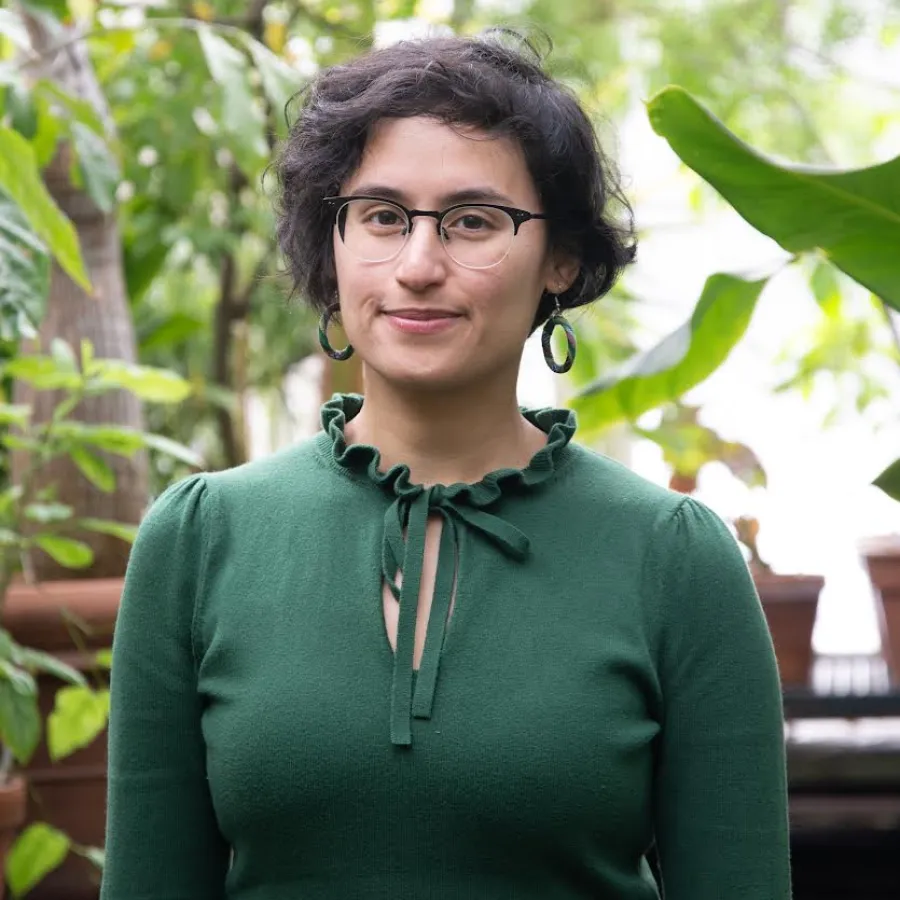Angela D’Souza, M.A.T. ’18, Joins the Botanic Garden as Manager of Engagement
News

Published April 14, 2025
Even before coming to University of Massachusetts, Amherst (UMass) as a PhD student, Angela D’Souza held an extensive academic history: she earned a M.A.T. in History at Smith in 2018; a MA in Anthropology at the New School for Social Research; a MA in Romance Languages at the University of New Orleans; and a BA in Psychology with a minor in Latin American Studies at Loyola University in New Orleans. Now, in addition to teaching in collaboration with Nuestras Raíces community farm and working on her PhD at UMass, D’Souza has joined the botanic garden staff as manager of engagement.
Through D’Souza’s role as manager of engagement, a new role at the garden, she will work to build campus and community partners in support of the botanic garden's mission to foster environmental and social justice through teaching and learning about plants, people, and place. She will also focus on supporting and developing the cherished volunteer program that helps the botanic garden run, and growing the k-12 program to bring more schools and students to the garden through collaborations and tours.
D’Souza plans to finish up her PhD program in Math, Science and Learning at UMass’s College of Education in December 2026. Her research questions are guiding both her dissertation as well as her new position at the botanic garden, as she explores relationships between people with each other and the larger-than-human world. “Coming to the botanic garden seems like a natural path because there are so many questions that plants and land spark in us as human beings that have relations to the world,” D’Souza said.
As a public school educator, D’Souza has noticed a lack of dialogue between teachers, as well as between teachers and students, and that is something she is considering and emphasizing through her work. In coming to the botanic garden, D’Souza has already had dialogues with students and educators alike, eager to connect with the community, and to help everyone else connect with each other.
“We have adults, we have students, and we recognize each other, I think, as teachers and learners, but a shift in my research question and my framework has really recognized the more-than-human world as a co-teacher, even more so as our first teacher,” D’Souza said. “By the more-than-human world, I mean plants, waterways, the ‘weather-world,’ animals, just kind of everything other than humans, but humans in relation.”
D’Souza describes herself as a curious person. She always has new questions about the world and people around her, whether they are as small as how her co-worker’s day was, or as big as an interrogation into what kind of boundaries exist in categorizing the natural world and why. At Smith, D’Souza’s curiosity is fed by the constant learning she does throughout her job and her interactions with the community around her.
“At Smith, I’m constantly learning, whether that's from students, getting a different perspective on something we’re all coming to together, or from the thousands and thousands of plants that are both in the greenhouses as well as throughout the campus,” D’Souza said. “It was walking to Smith as an M.A.T. student that made me rethink my relationship to time and my relationship to the natural world. Just noticing different trees or animals or grasses, that is my favorite part. I can always nourish my sense of curiosity here.”
While she has jumped into her new role at the botanic garden with passion and excitement, D’Souza also asks for understanding as she navigates her new position and adjusts to the role.
“I think a part of me is nervous that I'll make mistakes—but if we don't try, then we just kind of reproduce the same structures of inequity and harm. I'm grateful for people's confidence but also, I do ask for patience, and for grace and forgiveness. Because I think I will make mistakes,” D’Souza said. “I think I'm very lucky to be in a place where people, for the most part, do recognize that we are lifelong learners. I want to model that for the students that I work with, and I also definitely see that being modeled for me, from students as well as colleagues and mentors.”